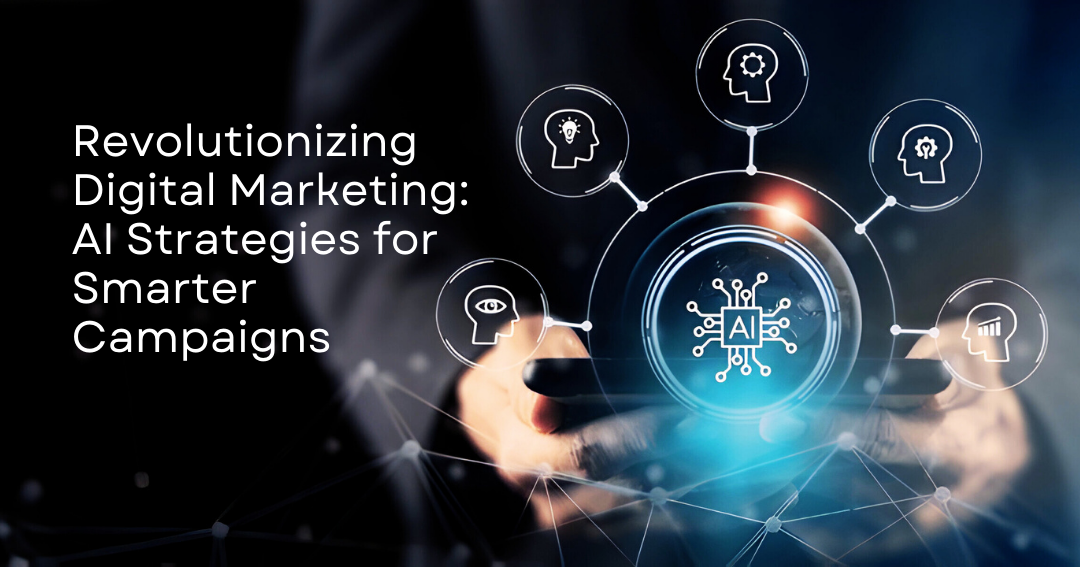
In the ever-evolving landscape of digital marketing, staying ahead of the curve is crucial for businesses aiming to capture the attention of their target audience. One of the most transformative trends reshaping the industry is the integration of Artificial Intelligence (AI). AI is revolutionizing digital marketing by offering unprecedented opportunities for smarter, more efficient, and highly personalized campaigns. In this article, we’ll explore how AI can be leveraged in digital marketing to create campaigns that are not only smarter but also more impactful.
The Rise of AI in Digital Marketing
AI is no longer a futuristic concept; it’s a reality that’s transforming the way businesses interact with their customers. From chatbots and personalized recommendations to predictive analytics and automated content creation, AI is enhancing various aspects of digital marketing. The ability to process and analyze vast amounts of data quickly and accurately makes AI an invaluable tool for marketers looking to gain deeper insights and deliver more personalized experiences.
1. Personalization at Scale
One of the most significant advantages of AI in digital marketing is its ability to deliver personalized content at scale. AI algorithms can analyze user data, including browsing history, purchase behavior, and engagement patterns, to create highly personalized content and recommendations. This level of personalization helps in building stronger connections with customers, leading to increased engagement and conversions.
For example, AI-powered recommendation engines, like those used by Amazon and Netflix, analyze user behavior to suggest products or content that users are likely to enjoy. This not only enhances the user experience but also increases the likelihood of conversion.
2. Enhanced Customer Insights
Understanding your audience is key to crafting effective marketing strategies. AI provides marketers with deeper insights into customer behavior and preferences. Through machine learning and natural language processing (NLP), AI can analyze social media conversations, reviews, and other forms of user-generated content to gauge public sentiment and identify emerging trends.
By harnessing these insights, marketers can create more relevant and timely campaigns that resonate with their audience. For instance, AI can help identify the most engaging content types or the optimal time to post on social media, ensuring that campaigns reach the right audience at the right time.
3. Predictive Analytics for Proactive Strategies
Predictive analytics, powered by AI, enables marketers to anticipate future trends and consumer behaviors. By analyzing historical data, AI can forecast future customer actions, such as purchase likelihood or churn risk. This allows businesses to take proactive measures, such as targeted promotions or retention strategies, to maximize customer lifetime value.
For example, e-commerce platforms can use predictive analytics to identify customers who are likely to churn and offer them personalized discounts or incentives to stay engaged. Similarly, predictive analytics can help in identifying the most promising leads, allowing sales teams to focus their efforts more effectively.
4. Chatbots and Virtual Assistants
AI-powered chatbots and virtual assistants are becoming increasingly popular for providing customer support and enhancing user engagement. These tools can handle a wide range of tasks, from answering common customer queries to assisting with the purchase process. By providing instant responses, chatbots improve customer satisfaction and reduce the workload on human support teams.
Moreover, AI-driven chatbots can learn and improve over time, offering more accurate and personalized responses as they gather more data. This not only enhances the customer experience but also helps in building brand loyalty.
5. Automated Content Creation
Creating high-quality content consistently can be a challenge for marketers. AI-powered tools can help by automating content creation processes, such as writing product descriptions, generating blog posts, or even creating video content. While AI-generated content may not replace human creativity entirely, it can significantly reduce the time and effort required to produce engaging content.
For instance, AI tools like GPT-3 can generate human-like text based on prompts, making it easier for marketers to create a large volume of content quickly. Additionally, AI can assist in content curation by recommending the most relevant articles or posts for sharing on social media.
6. Optimizing Ad Campaigns
AI is also transforming the way ad campaigns are managed and optimized. AI-powered platforms can analyze vast amounts of data to identify the best-performing ad creatives, target audiences, and bidding strategies. This allows marketers to optimize their ad spend and achieve better ROI.
For example, AI can help in identifying which ad copies or visuals resonate most with specific demographics, enabling more precise targeting. It can also automate the bidding process in real-time, ensuring that ads are shown to the right people at the right time, maximizing the chances of conversion.
Conclusion
As AI continues to evolve, its impact on digital marketing is only set to grow. By leveraging AI, businesses can create smarter, more efficient campaigns that deliver personalized experiences, deeper insights, and improved ROI. Whether it’s through personalized content, predictive analytics, chatbots, or automated content creation, AI offers a wealth of opportunities for marketers looking to stay ahead in an increasingly competitive landscape.
Embracing AI in digital marketing is no longer a luxury; it’s a necessity for businesses that want to thrive in the digital age. As we look to the future, the integration of AI will continue to be a driving force behind the innovation and evolution of digital marketing strategies.

